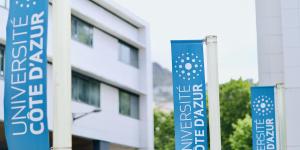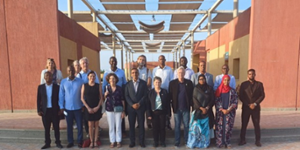Université Côte d'Azur and Enedis signed an agreement on Wednesday, September 24, 2025, on the Valrose Campus in Nice, to set up a collective solar energy self-consumption loop linking three of its Nice campuses: the Trotabas campus, the Carlone campus and the Fabron campus.
The signing ceremony was attended by Jeanick Brisswalter, President of Université Côte d'Azur, and Xavier Montuelle, Alpes-Maritimes Territorial Director of Enedis, in the presence of the teams involved in the project's deployment.
An innovative, mutually supportive project
The aim of this loop is simple and practical: to enable a campus producing solar-generated electricity to redistribute its surplus energy to other university sites.
In concrete terms, when the Fabron photovoltaic panels produce more than the site consumes, the surplus will automatically be redirected to the Carlone and Trotabas sites.
With a production potential of over 800 KWp, this new self-consumption loop will help to :
- reduce campus energy bills,
- reduce fossil fuel consumption,
- and strengthen inter-campus energy solidarity.
An initiative already underway at Sophia Antipolis
This initiative follows an initial self-consumption loop set up in April 2023 on the SophiaTech campus in Biot. With two photovoltaic power plants totalling over 650 KWp, SophiaTech has already demonstrated the benefits of this model: over the period September 2024 - September 2025, more than 139,500 kWh were generated and shared between the various buildings on the site.
Towards an ambitious sustainable energy strategy
This project is part of a global policy pursued for several years by Université Côte d'Azur to reduce its energy costs and improve its autonomy:
- installation of photovoltaic panels on several campuses,
- optimization of energy management systems with GECOS (Green Eco Campus Opendata System), a solution developed in-house,
- replacement of heating/cooling production systems,
- deployment of energy-efficient solutions.
The University plans to go even further with the creation of a "super loop" grouping together all the campuses in the city of Nice, to further mutualize production and reinforce energy resilience.
A booming business in France
Collective self-consumption is booming in France.
- At the end of June 2025, France had 1,111 operations in service (4 times more than in 2023) and 1,358 in the pipeline.
- On the Côte d'Azur, by the end of August 2025: 40 operations in service and 45 in the pipeline, including 18 in the Alpes-Maritimes.
This innovative model contributes to the national effort to reduce energy consumption, by enabling clean energy generated by photovoltaic panels to be shared locally via the infrastructure and smart meters managed by Enedis.
"With this partnership, Université Côte d'Azur confirms its role as a pioneer of innovation in the energy transition of its campuses, and demonstrates that synergy between campuses is a concrete lever for accelerating the transition to 100% eco-responsible campuses."Jeanick Brisswalter, President of Université Côte d'Azur
"Collective self-consumption is a lever for the ecological transition to which Enedis is very committed. This system enables solar energy to be shared between nearby buildings, thanks to the smart meters and electricity network infrastructure managed by the distributor. In the Alpes-Maritimes region, 17 collective self-consumption operations were in service by June 2025. A further 24 are under development. In France, 1,033 collective self-consumption systems are in service. This model makes it possible to participate in the common effort to reduce energy consumption, by producing energy on the roofs of the Université Côte d'Azur campuses that will be consumed locally" Xavier Montuelle, Territorial Director, Alpes-Maritimes. Enedis




